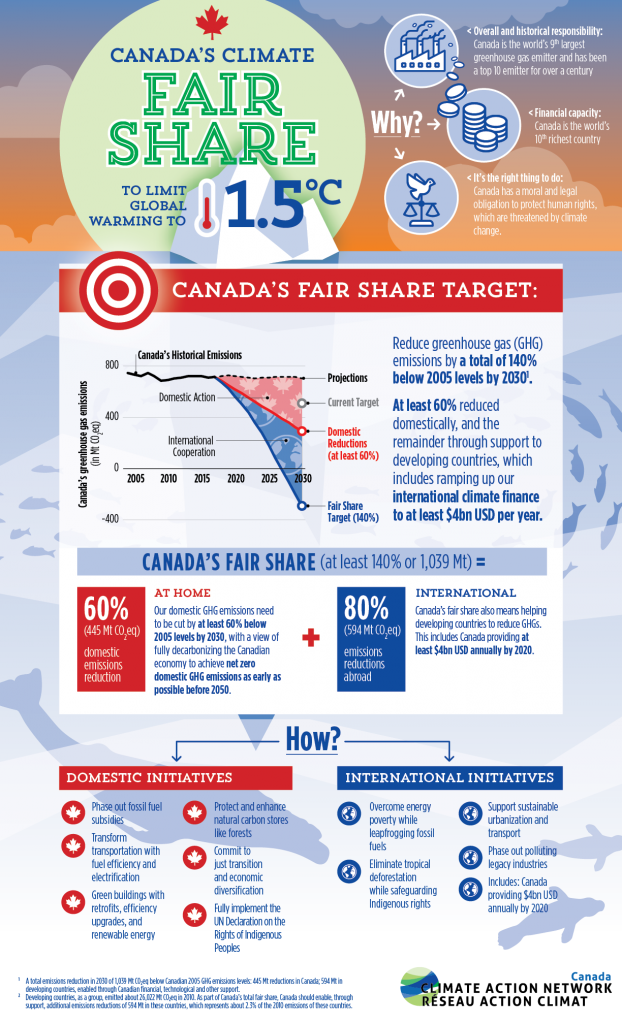Blog post and infographic explaining how and why Canada should contribute our fair share of global climate action
Canada’s Fair Share towards limiting global warming to 1.5°C
Climate Action Network Canada believes that Canada must do our fair share towards a global effort that ensures that global warming is limited to no more than 1.5°C without overshoot.
Canada has substantially contributed to the global buildup of greenhouse gas pollution in the atmosphere for over a century, and continues doing so today, reaping enormous economic benefits but also accumulating a substantial carbon debt. This means that Canada bears a large responsibility for creating the climate crisis and, as a wealthy country, possesses considerable capacity to act to address it. As a result, Canada has a moral obligation to cut our domestic greenhouse gas emissions as fast as technically and economically feasible, while also substantially supporting emissions reductions in developing nations as part of our total fair share towards a 1.5°C-consistent global effort.
Specifically, our domestic greenhouse gas emissions need to be cut at least by 60% below 2005 levels by 2030, with a view of fully decarbonizing the Canadian economy to achieve net zero domestic GHG emissions as early before 2050 as possible. Additionally, our fair share includes an obligation to enable a reduction in developing countries’ greenhouse gas emissions equivalent to a total Canadian contribution of 140% of Canadian 2005 emissions.1 This would cut emissions in all developing countries on average by 2.3% below their 2010 levels in 2030,2 in addition to the reductions that they achieve on their own or with other wealthier countries’ support. In order to achieve this level of international support, Canada needs to immediately enhance climate finance to mobilize $4bn USD annually by 2020, further enhance climate finance beyond 2020, while finding additional innovative ways to support mitigation in developing countries to ensure the overall mitigation impact of Canada’s domestic and international activities is in line with Canada’s total fair share.
Read the technical backgrounder that serves to outline the methodological and normative-ethical choices taken by members of Climate Action Network Canada – Réseau action climat Canada (CAN-Rac) in deriving their current position on Canada’s fair share towards a global mitigation effort consistent with limiting warming to 1.5°C, based on the findings of the IPCC Special Report on 1.5°C (IPCC SR15).
1. A total emissions reduction in 2030 of 1,039 Mt CO 2 eq below Canadian 2005 GHG emissions levels: 445 Mt CO 2 eq reductions in Canada; 594 Mt CO 2 eq in developing countries, enabled through Canadian financial, technological and other support.
2. Developing countries, as a group, emitted about 26,022 Mt CO 2 eq in 2010. As part of Canada’s total fair share, Canada should enable, through support, additional emissions reductions of 594 Mt in these countries, which represents about 2.3% of the 2010 emissions of these countries.
